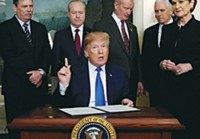Advertisement
Grab your lab coat. Let's get started
Welcome!
Welcome!
Create an account below to get 6 C&EN articles per month, receive newsletters and more - all free.
It seems this is your first time logging in online. Please enter the following information to continue.
As an ACS member you automatically get access to this site. All we need is few more details to create your reading experience.
Not you? Sign in with a different account.
Not you? Sign in with a different account.
ERROR 1
ERROR 1
ERROR 2
ERROR 2
ERROR 2
ERROR 2
ERROR 2
Password and Confirm password must match.
If you have an ACS member number, please enter it here so we can link this account to your membership. (optional)
ERROR 2
ACS values your privacy. By submitting your information, you are gaining access to C&EN and subscribing to our weekly newsletter. We use the information you provide to make your reading experience better, and we will never sell your data to third party members.
Policy
Congress passes bill to deter theft of trade secrets
Measure lets companies seek compensation in federal courts
by Glenn Hess
April 28, 2016
| A version of this story appeared in
Volume 94, Issue 18

Trade secrets of pharmaceutical, chemical, and other companies will soon enjoy greater legal protections against theft under bipartisan legislation headed to the White House for President Barack Obama’s expected signature.
The U.S. House of Representatives last week approved the Defend Trade Secrets Act of 2016 (S. 1890) on a 410-2 vote. The Senate passed the measure 87-0 on April 4.
Under the legislation, companies for the first time will be allowed to file lawsuits and seek monetary compensation in federal courts for the theft of trade secrets. This type of information includes manufacturing processes, formulas, and customer lists.
“This bill will help American innovators protect their intellectual property from criminal theft by foreign agents and those engaging in economic espionage,” House Judiciary Committee Chairman Bob Goodlatte (R-Va.) says.
The U.S. Chamber of Commerce’s Global Intellectual Property Center (GIPC) worked with more than 40 trade associations and companies to push the measure through Congress. The business coalition included Dow Chemical, DuPont, Eli Lilly & Co., Johnson & Johnson, and Pfizer.
“The trade secrets, unique formulas, and know-how that set these companies apart are constantly under attack from other countries and those wishing to steal their success,” says David Hirschmann, CEO of GIPC.
Congress made trade-secret theft a federal crime in 1996. But the Economic Espionage Act provides only for criminal cases lodged by the Justice Department. Companies are left to file civil lawsuits under state laws.
The legislation’s supporters say the Justice Department has limited resources to devote to commercial theft cases. Last year, federal prosecutors brought only 15 criminal cases for trade-secret theft.
Advocates also argue that a patchwork of state laws are ill-equipped to handle cases that cross state lines or involve foreign theft of company documents.
S. 1890 creates a uniform national standard for trade-secret misappropriation. Under the legislation, companies will be allowed to seek an order from a judge directing U.S. marshals to seize stolen information before it is used or taken out of the country. Companies could also win court orders to prevent the dissemination of a purloined trade secret and could seek compensation for losses.




Join the conversation
Contact the reporter
Submit a Letter to the Editor for publication
Engage with us on Twitter